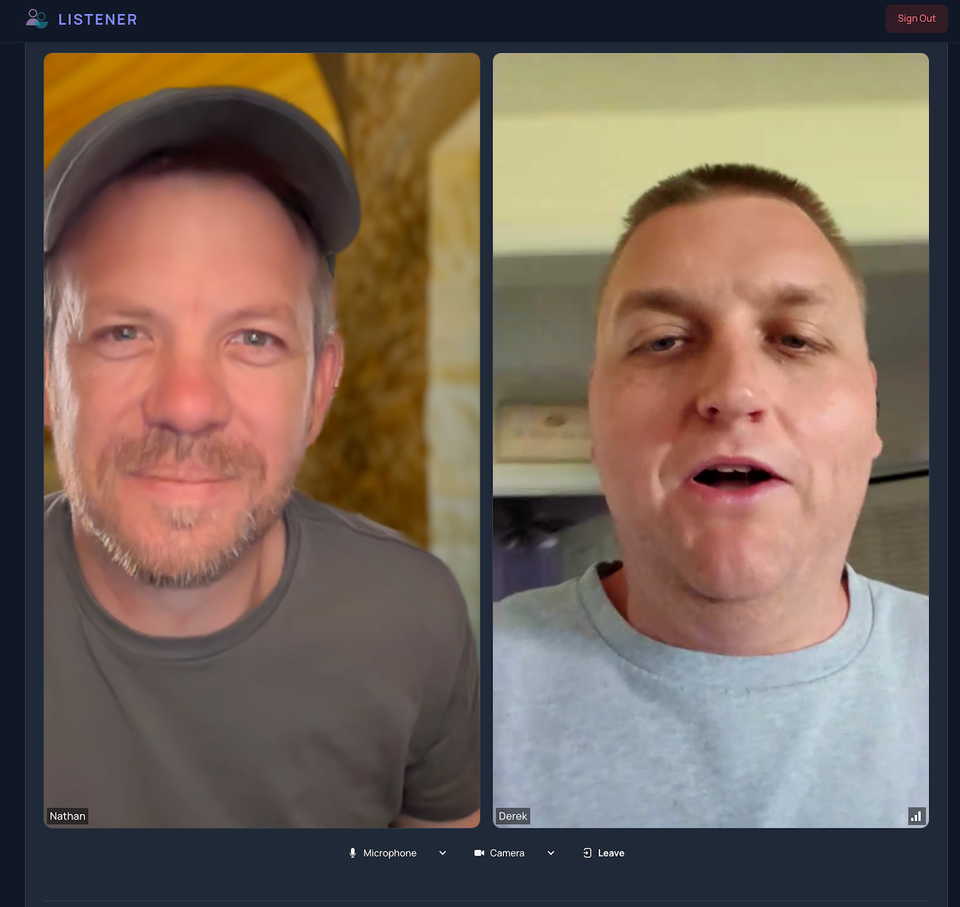My first session with a stranger...

My 9-year-old son asked me to add a listener session to the prototype website so he could help me test the latest features we've been building. After all, he’s been my #1 QA tester.
Although the session at 9:30 AM was meant to be for him to join, somehow, a man named Derek got the link and signed up for a session. I had never met Derek, but it was evident within a few minutes of our session that we shared a similar passion for mental health and listening. Keep reading to hear more of Derek's story and the unexpected podcast that came about as a result of our call.
One of Listener’s riskiest assumptions (to borrow Ash Maurya’s language) is whether people are willing to engage in (and pay for) a conversation with a stranger who lacks a clinical license. Although millions lack access to someone trained in deep listening, it remains untested whether this is a problem people feel acutely enough to overcome the inertia of the status quo and try a new solution like Listener.
I've spent many hours exploring other peer-to-peer and community mental health models like 7cups, peer warm lines, and novel solutions from universities involving graduate psychology students. Most of these are text/phone-based, anonymous, and often centered around crisis support. Listener is different.
Listener offers real-time, face-to-face connection via video through our custom platform, pairing carefully trained humans with the neuroscience of attunement. Each session is supported by an AI copilot grounded in years of research across 50+ academic disciplines, helping ensure conversations are safe, emotionally resonant, and genuinely healing. The results thus far have been stunning; people feel seen and heard, likely to refer, and experience meaningful shifts in how they show up in relationships, work, and daily life.
There have been numerous solutions to this growing mental health crisis, ranging from low to high human depth and scalability. Because most peer-to-peer solutions are text/phone-based, I consider these low in human depth. These often lack the real-time face-to-face presence that is often associated with traditional counseling practices.
On the more traditional side, we have solutions like BetterHelp and Talkspace, which offer high human depth but require licensing and accreditation that require years to obtain. While we need more therapists than ever, the supply/demand mismatch is only growing. The median cost for a master's in counseling is now $60,000 (U.S. News & World Report 2023), which takes 2-3 years after a 4-year undergraduate degree. After this, the National Board for Certified Counselors requires successful completion of at least 3,000 hours of documented, supervised postgraduate clinical counseling work. At the end of this multi-year process for full-time therapists, the average caseload typically ranges between 15 to 25 clients per week (source).
The math simply doesn’t scale. The mental health crisis is affecting millions, yet even with unlimited funding, the pipeline for professional therapists can’t come close to meeting the demand. We need alternatives that honor human connection—without requiring six years and a mountain of debt to reach just two dozen people a week.
As I've written a bit about previously, the increased usage of AI for companionship and what's now been termed as 'synthetic relationships' highlights an incredible need for connection. While these emotionally responsive chatbots create illusions of intimacy, they often lead to emotional dependence and addiction like use, degrading real-life social bonds.

Listener presents a fresh alternative to traditional and emerging solutions, as the first platform offering human-powered emotional presence at scale. It is still early days, but I believe this great need requires a new approach willing to experiment around the edges. Empowering everyday empathetic listeners with training and the latest research enabled through a trained AI agent is just the beginning!
My very first conversation with a stranger on the platform proved to be very meaningful and resulted in an invitation to come on Derek’s podcast - Show My Scars.
Below you’ll find an embed of this podcast where Derek and I talk about the power of empathetic listening and the genesis of Listener's unique approach to make the world a better place.
Listener Interview on Show my Scars Podcast
You can also find Show My Scars podcast on Apple, Spotify, Amazon, and YouTube.
If this mission resonates with you, consider joining us as a Listener Fellow. For just $5/month, you can help empower everyday people with the tools, training, and support to show up with deep empathy in a world starving for connection.